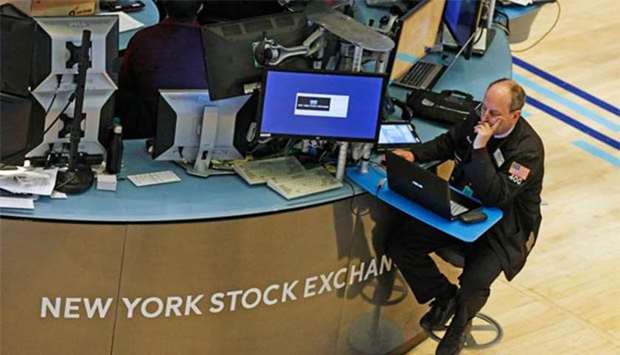A collective sigh of relief swept across global trading floors on Tuesday as bargain hunters swooped on Wall Street stocks, stemming a haemorrhage that had been spreading panic among investors.
With Asian and European equity markets plunging, New York stocks started their trading day with another jaw-dropping fall as the Dow index dived 2.7%, adding to the previous day's record-breaking loss.But within minutes a fierce battle seemed to be playing out between those betting on a further downturn and those who thought that the market correction had gone too far, leading to some wild price swings.
After a brief foray into positive territory, the Dow index stabilised at levels around 1% lower on the day.
"Dow up! Panic over, as you were everyone," tweeted James Hughes, chief market analyst at AxiTrader.
Jasper Lawler, head of research at London Capital Group tweeted "Trader's paradise out there right now", in a reference to volatility which boosts brokers' earnings.
European stock market were helped off the day's worst levels by the Wall Street recovery, but remained deeply in the red.
Investors have been fretting over the prospect of rising US interest rates.
The selloff began last Friday when bright US non-farm payrolls data sparked fears that inflation will surge this year -- and that the Federal Reserve will be forced to raise borrowing costs more quickly than anticipated.
In initial trade on Tuesday, European stock markets collapsed by about 3.5%, mirroring dramatic falls across Asia.
"It's not doom and gloom, and it's not financial markets Armageddon; it's just a much needed and much overdue correction," AxiTrader's Hughes told AFP.
New York's Dow Jones Industrial Average saw its steepest ever one-day point drop on Monday, shedding a total of 1,175.20 points or a hefty 4.6% in value.
And 10-year US Treasury yields were still hovering near four-year peaks.
The S&P 500, which shed 1.2% at the open, and the Nasdaq Composite, which fell 1.9% in early business, also cut their losses.
"Markets usually grind to the upside, but fall like a rock," said analyst Naeem Aslam at trading firm ThinkMarkets.
"Traders have been looking at the market for the past year moving in one direction which was skewed to the upside. Now, it's time for the bears to take their revenge."
Prior to this week's chaotic selloff, Wall Street had enjoyed an impressive record-breaking run ever since Trump's 2016 election on hopes over the US president's pro-business tax-cutting policies.
Asia and Europe had meanwhile reaped bumper gains from the improving economic outlook.
"If investors had been waiting for an opportunity to take profits, the prospect of higher than expected inflation and tightening by the Fed provided just that," added Richard Hunter, head of markets at online stockbroker Interactive Investor.
"Rising interest rates, whilst potentially good news for savers, increase the cost of borrowing and the possibility of loan defaults," he told AFP.
"Mixed in with that, higher bond yields could increase the attractiveness of bonds as an investment destination, some of which will be at the expense of equities."
On Tuesday, Tokyo stocks led a collapse throughout Asia, briefly diving almost seven percent before closing down 4.7%.
Hong Kong lost more than five percent in its worst day since summer 2015, while Sydney and Singapore each sank 3%.
On currency markets the yen, considered a go-to unit in times of turmoil and uncertainty, climbed against the dollar.
And bitcoin continued its spiral downwards after some banks banned their customers from buying it with credit cards. The news is the latest to hit the cryptocurrency after recent crackdowns by authorities in India, South Korea, China and Russia.
The unit was down more than 20% to a three-month low at $5,922 -- less than a third of its value near $20,000 in December.

